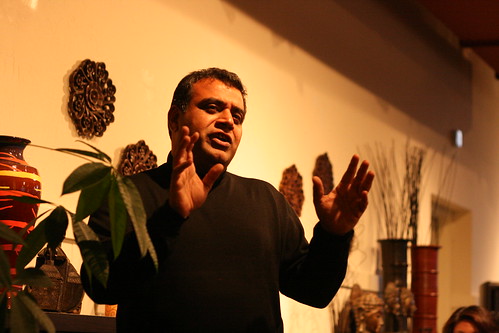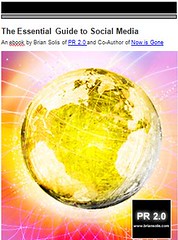The Evolution of the News Business - Did the New York Times Miss the Point?

The Business of News
Chapter I - The Town Crier
Chapter II - The Printing Press and Newspapers
Chapter III - Radio
Chapter IV - Television
Chapter V - The Web
Chapter VI - Mobile Alerts
Chapter VII - Blogs
OK, yes it's just a crude and simple representation of the evolution of news. My point is that blogs are merely the latest chapter, and not the only means for breaking news today. I think the New York Times neglected to write a more significant and complete story in its article, "In Web World of 24/7 Stress, Writers Blog Till They Drop."
Yes, we are traveling at light speed and not even realizing just how quickly we're missing everything else around us. It's like the movie Click where Adam Sandler fast-forwarded through his life only to realize that he had missed everything.
I had a heads up that the New York Times was going to run a controversial piece on blogging because they wanted to use one of my pictures in the story. I have yet to see the print version (although I hear my photo of Michael Arrington is on A29), but I have read the story online. If I were the type of blogger they were referring to in the story, I can tell you that I would have stopped everything I was doing to blog it yesterday. But I'm not in the news or scoop business. I simply could never keep up and maintain the already unbalanced, but happy, life I lead today.
The New York Times is making a case that bloggers blog until they literally drop and insinuates that its because they try to keep up with the frantic pace of news production.
The story really brought it home for me. It's a painful reminder that life is short, too short.
According to the NYT, "A growing work force of home-office laborers and entrepreneurs, armed with computers and smartphones and wired to the hilt, are toiling under great physical and emotional stress created by the around-the-clock Internet economy that demands a constant stream of news and comment."
The story continues to paint a grim picture for the blogosphere and also quotes Michael Arrington of TechCrunch, the number one blog on the web, "I haven’t died yet. At some point, I’ll have a nervous breakdown and be admitted to the hospital, or something else will happen. This is not sustainable.”
TechCrunch has earned millions in advertising revenue, which was hand-built by Michael from the ground up. In the story, Arrington admits to gaining 30 pounds in the last three years, developed a severe sleeping disorder and turned his home into an office for him and several employees.
Arrington shares additional thoughts on the relentless conditions of news blogging, "There’s no time ever — including when you’re sleeping — when you’re not worried about missing a story. Wouldn’t it be great if we said no blogger or journalist could write a story between 8 p.m. Pacific time and dawn? Then we could all take a break. But that’s never going to happen.”
The blogosphere is 24/7, but then again, so is the news business. News never stops and it's not unique to blogs - it just hits closer to home because now people, thanks to social media, can relate to the process of publishing content (there are over 100 million blogs in the world today).
Blogging is merely the latest chapter in the business of finding, scooping, and breaking news. Even with the slightest lead (milliseconds), blogs can appear to have broken the story through news aggregation sites and blog search engines, which can equate to greater revenues. But, it is not any different than the previous decades where newspapers and broadcast networks fought every minute of every day to break the stories that help them retain their position as the primary source for news.
How many heart attacks have gone unnoticed in the world of print and broadcast journalism over the last 100 years?
Unfortunately too many.
However, let's step back for a moment.
I think we can all agree that the news business isn't going to stop trying to beat each other to the punch. There's acclaim and glory associated with scooping others. They're rewarded for it in the form of awards, readers, and most importantly, money.
The Web is the latest medium that only expedites the hectic pace to publish and read news.

Nothing changes the fact that we, as people, are hungry for consuming information, and everything contributes to the rapid evolution of our society and our drive and satisfaction for quick news bursts wherever we are. And, whether you noticed it or not, news is finding its way to us any way and anywhere courtesy of new technology. We contribute to the "short attention span" theater by trying to keep up with the firehouse of content and it is reflective in the state of our engagement.
Doc Searls, whom I also greatly admire, has asked us to examine blogging versus flogging in his latest post in response to the NYT piece, "There is a difference in kind between writing to produce understanding and writing to produce money, even when they overlap. There are matters of purpose to consider, and how one drives (or even corrupts) the other."
Searls continues, "One is about chilling out. Blogging doesn’t need to be a race. Really. The other is about scoops. They’re overrated. Winning in too many cases is a badge of self-satisfaction one pins on oneself. I submit that’s true even if Memeorandum or Digg pins it on you first. In the larger scheme of things, even if the larger scheme is making money, it doesn’t matter as much as it might seem at the time."
Personally I blog to share information, ideas, and thoughts and observations that may or may not help people. I'm not in the news business. Nor am I in the blogging business. But even still, it is a significant commitment, one I'm currently weighing in the greater scheme of life/work balance. I'm sure I'm not alone.
At the end of the day, I don't pledge allegiance to any one blog or traditional media outlet for their reputation of breaking news. Instead I choose those who offer valuable perspective and insight to help me interpret it.
This part is dedicated to the good friends and thought leaders who are mentioned in this post. Alive or no longer with us, they have contributed significantly to journalism and the blogosphere.

Michael Arrington, snapped at the Churchill Club Bootstrapping event

Om Malik, shot at The Ladders party.

Doc Searls

Marc Orchant, shot at DEMOfall 07 in San Diego.



Connect with me on Twitter, Jaiku, LinkedIn, Pownce, Plaxo, FriendFeed, or Facebook.
blogging blog blogger newyorktimes techcrunch om+malik michael+arrington gigaom doc+searls new york times journalism blogosphere evolution media media+2.0 media2.0 social+media social new+media print online broadcast journalist reporter













2 Comments:
After reading the NYTimes article and this post, I was reminded of the tragic figure Willy Lowman in Death of a Salesman. I poked around the Internet and found an essay published in 1998 by Joyce Carol Oates titled: "Arthur Miller's Death of a Salesman: A Celebration." The last paragraph of the essay struck a chord: "As we near the twenty-first century, it seems evident that America has become an ever more frantic, self-mesmerized world of salesmanship, image without substance, empty advertising rhetoric, and that peculiar product of our consumer culture “public relations”—a synonym for hypocrisy, deceit, fraud."
So many desperate people and so few straight jackets.
First I would like to acknowledge that I did not and do not intend to read the NY Times articles; I just don't have the time
Second, I want to congratulate you, Brian, for your reasoned response to what appears to be a less than stellar article (let's assume the writer/journalist didn't have enough time to do a thorough job and still make deadlines).
Third, I want to ask a question: Is it really just now occurring to everyone that life is too short to expend every breath worrying about the next big story and who is going to get the scoop and/or credit? In any event, better late than never!
Finally, I would like to share a thought about the evolution of Internet technology (and PR for that matter), courtesy of Dr. Ian Malcolm: "I'll tell you the problem with the scientific power that you're using here: it didn't require any discipline to attain it. You read what others had done and you took the next step. You didn't earn the knowledge for yourselves, so you don't take any responsibility for it. You stood on the shoulders of geniuses to accomplish something as fast as you could and before you even knew what you had you patented it and packaged it and slapped it on a plastic lunchbox, and now you're selling it, you want to sell it!"
Post a Comment
<< Home